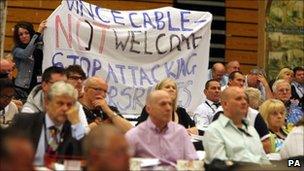Vince Cable warns GMB against co-ordinated strikes
- Published
- comments
Vince Cable is heckled during his speech to the GMB conference
Business Secretary Vince Cable was booed and heckled as he warned delegates at the GMB union's conference that co-ordinated strike action may lead to tougher union laws.
Unions say there could be significant public sector strikes on 30 June.
Mr Cable said that if the level of strikes remained low there would not be a compelling case for tighter laws.
But he warned that the pressure on him to act would ratchet up if there was widespread disruption.
Mr Cable was heckled, and met with boos and jeers at various points throughout his speech, the only cheers coming when he mentioned the prospect of a day of industrial action across significant parts of the public sector.
The 700,000-member GMB union represents workers across all industries in both the private and public sectors.
But the general secretary GMB, Paul Kenny, said Mr Cable's speech may have increased the chance of widespread disruption.
"The GMB and other unions are still in negotiation. My honest view is that speech today... I think that has been very unhelpful," he told the BBC.
"I think people's reaction on the ground is going to be 'if you're going to threaten us, bring it on'."
'Serious damage'
Addressing delegates in Brighton, Mr Cable said: "We are undoubtedly entering a difficult period. Cool heads will be required all round. Despite occasional blips, I know that strike levels remain historically low, especially in the private sector.
"On that basis, and assuming this pattern continues, the case for changing strike law is not compelling.
"However, should the position change, and should strikes impose serious damage to our economic and social fabric, the pressure on us to act would ratchet up.
"That is something which both you, and certainly I, would want to avoid," he said to loud jeers from the audience, at which point the chair had to intervene.
Mr Cable conceded that feelings were running high in the trade union movement, as demonstrations in March showed.
But he called for unions and the government to work together to deal with economic challenges.
"I want a mature and productive relationship with trade unions," he said.
'Double standards'
Unions reacted angrily to the speech.
"Government ministers come onto the TV and the media, saying it's ok to have protests and strikes in Egypt but when it comes to workers' protests in this country we think we should legislate them out of business," the GMB's Paul Kenny said.
"It's double standards. They wouldn't apply the same rules they're talking about applying for trade union ballots as they would do in electing MPs, or even the recent AV referendum," he added.
Len McCluskey, general secretary of the UK's largest union Unite, said Mr Cable ought to be ashamed.
"How can a professed liberal seek to crack down on human rights?" he said.
"Talking tough about cracking down on working people is a circus engineered by a government that is clueless about the real problems facing this country, which is how do we breathe life back into our shops, businesses and High Streets and how do we get the millions on the dole back to work."
Ahead of the conference, the Chancellor, George Osborne, said Mr Cable was voicing the coalition's position.
"Vince Cable is absolutely right. He speaks, of course, for the government, and I agree with him," Mr Osborne told the BBC.
"What Vince is saying is that if we got into a cycle of destructive strikes, we'd have to think again, but let's hope we don't get there."
The prime minister's spokesman said there were no current plans to amend strike laws but "it is something we keep under review".
Higher threshold

Some members held up banners during the speech
The British Chambers of Commerce (BCC) said Mr Cable was right to warn against mass strikes in the months ahead.
"In the current climate, large-scale industrial action would have a significant impact on business confidence and inward investment, which are both critical to the UK's economic recovery," Dr Adam Marshall, director of policy at the BCC, said.
The Mayor of London, Boris Johnson, and employers' organisation the CBI have already called for tougher trade union laws.
Currently, a strike may be called if a simple majority of those who respond to the ballot vote in favour of strike action.
But Mr Johnson wants laws to prevent a strike taking place unless at least half of the union members in a workplace take part in a ballot.
He has criticised the government as being "lily-livered" for not taking firmer action.
The CBI has called for a minimum of 40% of union members balloted to be in favour of a strike before it can take place.
Some 250,000 civil servants in the PCS union are currently being balloted on whether to take strike action over government spending cuts.
Any PCS action could lead to co-ordinated walkouts, with 750,000 teachers, lecturers and other workers taking part in the largest joint-union walkout in years.
- Published31 January 2011
- Published2 June 2011
- Published25 May 2011
- Published4 October 2010